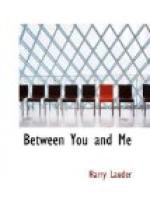I went clear across America and back in that long tour. When I came back it was just as the Germans began their last drive. Ye’ll be minding hoo black things looked for a while, when they broke our British line, or bent it back, rather, where the Fifth Army kept the watch? Mind you, I’d been over all that country our armies had reclaimed frae the Hun in the long Battle o’ the Somme. My boy John, the wean I’d seen grow frae a nursling in his mither’s arms, had focht in that battle.
He’d been wounded, and come hame tae his mither to be nursed back to health. She’d done that, and she’d blessed him, and kissed him gude bye, and he’d gone oot there again. And—that time, he stayed. There’s a few words I can see, written on a bit o’ yellow paper, each time I close ma een.
“Captain John Lauder, killed, December 28. Official.”
Aye, I’d gone all ower that land in which he’d focht. I’d seen the spot where he was killed. I’d lain doon beside his grave. And then, in the spring of 1918, as I travelled back toward New York, across America, the Hun swept doon again through Peronne and Bapaume. He took back a’ that land British blood had been spilled like watter to regain frae him.
The pity of it! Sae I was thinking each day as I read the bulletins! Had America come in tae late? I’d read the words of Sir Douglas Haig, that braw and canny Scot wha held the British line in France, when he said Britain was fichtin’ wi’ her back tae the wall. Was Ypres to be lost, after four years? Was the Channel to be laid open to the Hun? It lookit sae, for a time.
I was like a man possessed by a de’il, I’m thinking, in you days. I couldna think of ought but the way the laddies were suffering in France. And it filled me wi’ rage tae see those who couldna or wouldna understand. They’d sit there when I begged them to buy Liberty Bonds, and they’d be sae slow to see what I was driving at. I lost ma temper, sometimes. Whiles I’d say things to an audience that were no so, that were unfair. If I was unjust to any in those days, I’m sorry. But they maun understand that ma heart was in France, wi’ them that was deein’ and suffering new tortures every day. I’d seen what I was talking of.
Whiles, in America, I was near to bein’ ashamed, for the way I was always seekin’ to gain the siller o’ them that came to hear me sing. I was raising money for ma fund for the Scotch wounded. I’d a bit poem I’d written that was printed on a card to be sold, and there were some wee stamps. Mrs. Lauder helped me. Each day, as an audience went oot, she’d be in the lobby, and we raised a grand sum before we were done. And whiles, too, when I spoke on the stage, money would come raining doon, so that it looked like a green snowstorm.
I maun no be held to account too strictly, I’m thinking, for the hard things I sometimes said on that tour. I tak’ back nothing that was deserved; there were toons, and fine they’ll ken themselves wi’oot ma naming them, that ought to be ashamed of themselves. There was the book I wrote. Every nicht I’d auction off a copy to the highest bidder—the money tae gae tae the puir wounded laddies in Scotland. A copy went for five thousand dollars ane nicht in New York!




